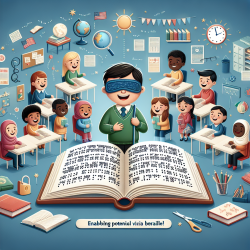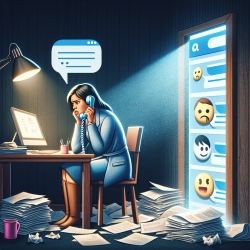Braille, a coding system using patterns of raised dots to represent letters and words, has long been a crucial tool for students with visual impairments, including those who are completely blind. It enables these students to learn in their primary language, whether through the Unified English Braille (UEB) or Nemeth code for mathematics and science. But beyond its use in daily learning, braille's role in educational assessments is both transformative and complex.
The National Center on Educational Outcomes (NCEO) provides a comprehensive overview of braille as an assessment accommodation in their Accommodations Toolkit. This fact sheet delves into the nuances of braille in education, highlighting the necessity of matching the version of braille used in assessments with that which students use in classroom settings. The importance of this accommodation cannot be overstated, as it ensures that students who are blind or have visual impairments are provided with equitable opportunities to demonstrate their knowledge and skills.
Research findings on braille's implementation in assessments are promising. Studies have shown that braille can have a positive impact on the performance of visually impaired students in both reading and mathematics assessments. Notably, students reading multiple-choice social studies items in braille scored higher than their peers with no visual disabilities reading standard print, and higher than students with low vision reading enlarged font. These findings underscore the effectiveness of braille in leveling the playing field for students with visual impairments.
However, the implementation of braille is not without its challenges. Certain item types, especially in mathematics, can be more difficult to render in braille. Moreover, refreshable braille displays, while innovative, have faced difficulties in presenting some punctuation symbols. These obstacles highlight the need for ongoing research and development to enhance the accessibility and accuracy of braille in assessments.
Perceptions of braille among students and teachers also play a significant role in its effectiveness. One study found that students who are familiar with braille prefer it over orally delivered assessments, allowing them to engage with the material at their own pace. Teachers' philosophies on reading further influence the accessibility options available to students, with those valuing the sounding out of words more likely to offer accommodations beyond braille.
Overall, the research indicates that braille as an assessment accommodation has benefited students with visual disabilities. It allows them to engage directly with test materials, potentially in combination with other accommodations like extended time or separate settings. Yet, some tests or items may interact problematically with braille coding, affecting the accuracy of scores. This underscores the importance of considering braille throughout the test development process.
Despite the wealth of research conducted, there is a clear need for further studies, particularly on the use of refreshable braille in assessments. Much of the existing research is over a decade old, and no recent studies have been identified that address this topic. As technology and educational practices evolve, so too must our understanding of how best to support students with visual impairments in demonstrating their academic abilities.
Braille remains a vital tool in ensuring that students with visual impairments have access to equitable educational opportunities. By continuing to research and refine the use of braille in assessments, we can unlock the full potential of these students, allowing them to showcase their knowledge and skills on an equal footing with their peers.
For more information, please follow this link.










